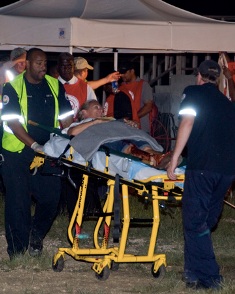Archive for July, 2010

Stop your child becoming a screen addict
 (BBC): It used to be that playing computer games was a fun and harmless pastime – but not any more. Although not officially classified as an addiction, parents and professionals are becoming increasingly alarmed at the rising number of young people shunning normal ‘fun’ activities and family life in favour of playing computer games in isolation. It is not uncommon for children to spend upwards of six to eight hours daily on their computers playing games. And now increasing numbers of childrenand teenagers are experiencing the negative effects of gaming.
(BBC): It used to be that playing computer games was a fun and harmless pastime – but not any more. Although not officially classified as an addiction, parents and professionals are becoming increasingly alarmed at the rising number of young people shunning normal ‘fun’ activities and family life in favour of playing computer games in isolation. It is not uncommon for children to spend upwards of six to eight hours daily on their computers playing games. And now increasing numbers of childrenand teenagers are experiencing the negative effects of gaming.

Cayman judge says Saudi may be proper place for suit
 (Bloomberg): Saudi Arabia may be a more appropriate location for claims in a lawsuit filed in the Cayman Islands against Saudi billionaire Maan al-Sanea by members of the kingdom’s Algosaibi family, according to a court decision. In the lawsuit, the Algosaibi group alleged Al-Sanea misappropriated $9.2 billion from the group’s units in part to fund his Saad Group of Companies. Al-Sanea has denied any wrongdoing, saying Algosaibi was aware of the borrowing. [Chief Justice Anthony] Smellie stayed the litigation until a committee appointed by the Saudi government rules on related petitions made there by the Algosaibi family.
(Bloomberg): Saudi Arabia may be a more appropriate location for claims in a lawsuit filed in the Cayman Islands against Saudi billionaire Maan al-Sanea by members of the kingdom’s Algosaibi family, according to a court decision. In the lawsuit, the Algosaibi group alleged Al-Sanea misappropriated $9.2 billion from the group’s units in part to fund his Saad Group of Companies. Al-Sanea has denied any wrongdoing, saying Algosaibi was aware of the borrowing. [Chief Justice Anthony] Smellie stayed the litigation until a committee appointed by the Saudi government rules on related petitions made there by the Algosaibi family.

Lime brings a world of books to the library
(CNS): A local telecoms firm has partnered with the George Town Library and a computer skills software programme to help people upgrade their sills and further their education without breaking the bank. LIME with Skillsoft 24/7 offers the opportunity to read text books, do research and access the latest information on-line at the library. Juliet Lawson Acting Head of the George Town Library explained that the new partnership would provide free learning and information for library clients from basic literacy to local culture. She explained that the Cayman Islands Public Library Service is committed to enriching and empowering the lives of every person in the community.

A welcome ‘reception’ at the capital’s primary school
 (CNS): For the first time in almost two decades parents living in the George Town Primary School catchment area are being offered a chance to send their children to a reception class for the new school year. Part of a pilot programme, through which the Ministry of Education is exploring the possibility of reintroducing reception classes to all government primary schools, George Town Primary will offer these classes to students who are at least 4 years of age on 1 September 2010 but who fall below the age for school entry. At present only the primary schools on the Brac and those in East End and North Side offer a reception class.
(CNS): For the first time in almost two decades parents living in the George Town Primary School catchment area are being offered a chance to send their children to a reception class for the new school year. Part of a pilot programme, through which the Ministry of Education is exploring the possibility of reintroducing reception classes to all government primary schools, George Town Primary will offer these classes to students who are at least 4 years of age on 1 September 2010 but who fall below the age for school entry. At present only the primary schools on the Brac and those in East End and North Side offer a reception class.

Cayman breaks medal record
 (CNS): Update 12noon – Thanks to the aquatic talents of Cayman’s swimming brothers, Shaune and Brett Fraser, and the speed of Cydonie Mothersill, the Cayman Islands is on course for a record breaking Central American and Caribbean (CAC) Games this year. With many of the track and field events still to come, the country’s athletes have already made history by bringing in seven medals – the most ever for a Cayman team. The Fraser’s have brought home four medals after Shaune grabbed gold in the 200m freestyle and bronze in the 100m, while Brett took silver in both the 200m freestyle and the 200m backstroke.
(CNS): Update 12noon – Thanks to the aquatic talents of Cayman’s swimming brothers, Shaune and Brett Fraser, and the speed of Cydonie Mothersill, the Cayman Islands is on course for a record breaking Central American and Caribbean (CAC) Games this year. With many of the track and field events still to come, the country’s athletes have already made history by bringing in seven medals – the most ever for a Cayman team. The Fraser’s have brought home four medals after Shaune grabbed gold in the 200m freestyle and bronze in the 100m, while Brett took silver in both the 200m freestyle and the 200m backstroke.
 Mothersill also won the gold medal in 22.91 seconds in the 200mere final, ahead of Carol Rodrigues and Darlenis Obregona who were second and third respectively with times of 23.37 and 23.76 respectively. Pompey’s time was 24.27s.
Mothersill also won the gold medal in 22.91 seconds in the 200mere final, ahead of Carol Rodrigues and Darlenis Obregona who were second and third respectively with times of 23.37 and 23.76 respectively. Pompey’s time was 24.27s.
Emergency services stage mock plane crash
 (CNS): According to Government Information Services the emergency services mock air accident was successfully carried out last night. During Operation Heron, fire, police and ambulance personnel as well as CIAA staff responded to a staged Plain Air Airbus 320 crash in an undeveloped area north of the east end of the runway at Owen Roberts International Airport. In the exercise the plane had 29 passengers and crew on board and four hours of fuel. During the drill two people were killed while ten were seriously injured and were transferred to the Cayman Islands Hospital during the exercise. (Photo by Dennie Warren Jr)
(CNS): According to Government Information Services the emergency services mock air accident was successfully carried out last night. During Operation Heron, fire, police and ambulance personnel as well as CIAA staff responded to a staged Plain Air Airbus 320 crash in an undeveloped area north of the east end of the runway at Owen Roberts International Airport. In the exercise the plane had 29 passengers and crew on board and four hours of fuel. During the drill two people were killed while ten were seriously injured and were transferred to the Cayman Islands Hospital during the exercise. (Photo by Dennie Warren Jr)
Seven people played the part of the walking wounded who were dispatched to Chrissie Tomlinson Memorial Hospital for treatment. The captain of the staged crash escaped unharmed.

Stolen generator turns up in Jamaica
 (CNS): Local police are looking for the owners of a Red Troy Bilt generator, model # 1924 (left). The RCIPS said the generator was recovered by police in Jamaica and they are now seeking a possible owner in the Cayman Islands. Officers said they have the generator serial number which can be used to verify the owner’s claims or alternately if they do not know the number police have asked the owners to call and provide distinguishing marks on the generator. Police are asking replies to be directed to DC Ian McDonald on (345)525â€8749.
(CNS): Local police are looking for the owners of a Red Troy Bilt generator, model # 1924 (left). The RCIPS said the generator was recovered by police in Jamaica and they are now seeking a possible owner in the Cayman Islands. Officers said they have the generator serial number which can be used to verify the owner’s claims or alternately if they do not know the number police have asked the owners to call and provide distinguishing marks on the generator. Police are asking replies to be directed to DC Ian McDonald on (345)525â€8749.

Regressive taxation & small business: a tale of woe
Successive governments in the Cayman Islands have sold to the populace that much of the success of islands is based on its indirect and highly regressive tax system. Given the Anglo-Saxon predisposition to measure “success” in terms of aggregates (GDP and conspicuous consumption patterns chief amongst the favoured measurements), they may well be correct.
Empirical data from diverse societies across all continents lend strong support to the view that a regime of regressive taxes (fee based levies, Value Added Taxes, etc.) substantially favour the rich and big businesses and unduly punish the middle and lower income groups and small businesses.
The Cayman situation is made ever more inequitable by the fact that the penalized groups account for the vast majority of the local populace, whilst the favoured groupings are in the main comprised of transients and convenience domicile seekers.
I would like to offer an insight into the small business operation I have been responsible for over the pastten years to fully demonstrate how the favoured taxation structure inhibits the growth of small businesses, particularly in the much vaunted financial service sector.
The company in question, Financial Integrated Services, is a locally owned and operated financial services company, geared towards the provision of a range of financial services to lower income clients and small businesses.
The most recently introduced regressive tax is directed at the relatively small remittance business (the levels of remittances effected through the licensed money services is less than 2% of the remittance activities of the banking sector).
In the case of FIS, the AVERAGE MONTHLY GROSS REVENUE generated on the remittance activity is in the region of US$100,000.00. Over 75% of the GROSS REVENUE is transferable to the principal, Moneygram, which provides the service’s global reach.
The GROSS REVENUE generated at the local operational level is in the region ofUS$25,000.00 per month. The Monthly Tax levied by Government on the local operation and its clients is 160%, yes a draconian 160% of the Gross Revenue generated to the local business. Medieval princes would indeed be envious of such an arrangement.
On the aggregate Gross revenues generated by the business, this equates to a tax rate of over 40%. The other 98% of the legal remittance business conducted through the commercial banking sector is in the meantime totally exempt from any fee levy/ transaction taxes. Not unsurprisingly the business is slowly migrating to the tax exempt banks.
The punitive nature of the tax regime extends to the other areas of the subject operation. The operation’s accounting function is geared to providing accounting support services to small business.
There can be no denial that in the modern environment small businesses if they are to be afforded the opportunity to grow and advance have to have reasonable access to affordable accounting services.
Work permit fees, which is the primary tax in this segment of the business, is $10,000.00 per accountant. The average charge-out rate for a big four accountant allows for a cost recovery rate of the attendant annual work permit fee that is at least three times as fast as the charge out rate that is tolerable at the small business level.
The picture is the same in the insurance segment of the business. I dare say that this picture is very much the reality for small businesses across the spectrum.
The particular irony of the specific case of this company is that all concerned have sought to structure the operation with a view to seeking to deliver the greatest possible economic benefit to the domestic economy, hence the staffing complement of 20 is comprised of 15 full time employees, of whom only two are work permit holders, and three of the four part time employees are active retirees, the other two being tertiary level students. The demise of the company would have a much greater lasting negative impact than in a case where a larger proportion of the work force were transient.
The tendency over the years has been for ordinary folks to presume that the regressive indirect tax structure that has been the mainstay of the fiscal policy of every government for the past 30 years is vital to the ongoing economic success of the country. Arguably the current tax regime serves mainly to preserve the “natural order” of our established trickle-down society.
We must challenge our leaders to show how the perpetuation of policies and incentive structures that favour transient activities and penalize domestic ally generated initiative can in fact be to the long term benefit of the citizens.
Case in point: How do they equate pronouncements by vested interests of the so-called successes such as of the listing of 7.7 billion of CAT Bonds on the on the Cayman Islands Stock Exchange, (ostensibly ascendancy to a global leadership position) in the period since the start of the global financial crisis, with the fact that its owner – the government – is having to cover the deficit on the backs of its heavily laden core of middle and lower income residents and citizens in its futile attempts to cover a comparatively modest deficit of under $100 million?

“Operation Heron” set for tonight
(CNS): A mock aircraft accident, which was postponed last week due to the risk of lightning strikes, will take place tonight (Tuesday, 27 July), the Cayman Islands Airport Authority (CIAA) has confirmed. Following a visit to the proposed accident site at 11:00 am, the CIAA’s Airport Emergency Exercise Committee has said that the “Accident” will be staged at an undisclosed site within close proximity to the airport, though the CIAA noted that the exercise will not take place during rush hour traffic.
However, as part of the exercise emergency vehicles will be entering and leaving the airport area, and although the exact location of the emergency exercise is not being revealed, drivers in the area can expect periodic roadblocks, the CIAA has warned.
RCIPS Superintendent Adrian Seales said, “It will be necessary for the RCIPS to stop traffic at various street lights and junctions along Smith Road, Crewe Road, Owen Roberts Drive and surrounding roads in the Industrial Park area. While these disruptions are necessary to accommodate the passage of emergency vehicles, we will endeavour to minimize the inconvenience to the motoring public.”
Explaining the need for these Exercises to be held, the CIAA’s Senior Manager Airport Operations and Chairman of the Airport Emergency Committee, Kerith McCoy, said it is crucial for airport personnel and supporting emergency responders to test their readiness on a regular basis to ensure they are fully prepared in the event of a real aircraft accident.
The Airport Emergency Committee comprises representatives from the Cayman Islands Airports Authority, Airlines, 911 Emergency Communications, Government Information Services/Joint CommunicationsServices, Hazard Management Cayman Islands, the Royal Cayman Islands Police Service, the Cayman Islands Fire Service, the Cayman Islands Health Services Authority, the National Roads Authority, the Department of Environmental Health, the Red Cross and the Port Authority.

Ofcom calls for clarity in broadband speed ads
 (BBC): Britons are not getting the broadband services they are being sold, research by the regulator Ofcom suggests. Its analysis of broadband speeds in the UK shows that, for some services, 97% of consumers do not get the advertised speed. It also shows a growing gap between the claims ISPs make for broadband and the speed being delivered. To fix the problem, Ofcom is revamping the code of conduct for ISPs and asking for changes to how broadband is sold. The regulator’s survey shows that the average residential broadband speed in the UK has risen in the last 12 months from 4.1Megabits per second (Mbps) to 5.2Mbps. The report also reveals the changing nature of UK broadband.
(BBC): Britons are not getting the broadband services they are being sold, research by the regulator Ofcom suggests. Its analysis of broadband speeds in the UK shows that, for some services, 97% of consumers do not get the advertised speed. It also shows a growing gap between the claims ISPs make for broadband and the speed being delivered. To fix the problem, Ofcom is revamping the code of conduct for ISPs and asking for changes to how broadband is sold. The regulator’s survey shows that the average residential broadband speed in the UK has risen in the last 12 months from 4.1Megabits per second (Mbps) to 5.2Mbps. The report also reveals the changing nature of UK broadband.